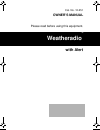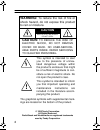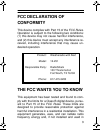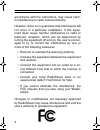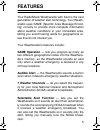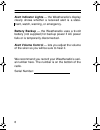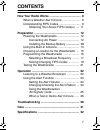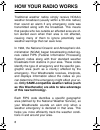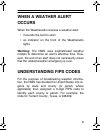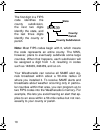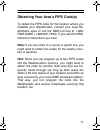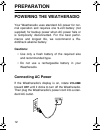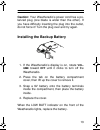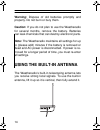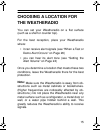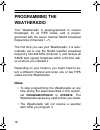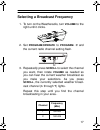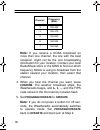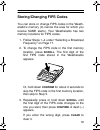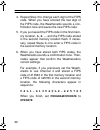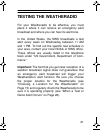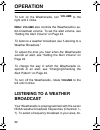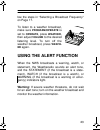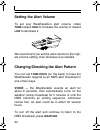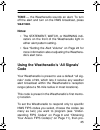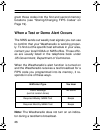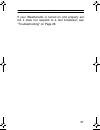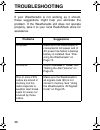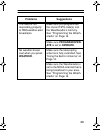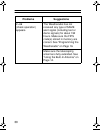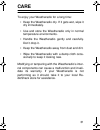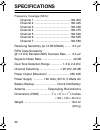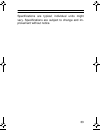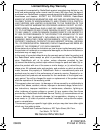- DL manuals
- Tandy
- Weather Radio
- Weatheradio
- Owner's Manual
Tandy Weatheradio Owner's Manual
Summary of Weatheradio
Page 1
Cat. No. 12-251 owner’s manual please read before using this equipment. Weatheradio ® with alert 12-251.Fm page 1 tuesday, march 14, 2000 12:40 pm.
Page 2: Warning:
2 warning: to reduce the risk of fire or shock hazard, do not expose this product to rain or moisture. Caution risk of electric shock. Do not open. Caution: to reduce the risk of electric shock, do not remove cover or back. No user-service- able parts inside. Refer servicing to qualified personnel. ...
Page 3: Fcc Declaration of
3 fcc declaration of conformity this device complies with part 15 of the fcc rules. Operation is subject to the following two conditions: (1) this device may not cause harmful interference, and (2) this device must accept any interference re- ceived, including interference that may cause un- desired...
Page 4
4 accordance with the instructions, may cause harm- ful interference to radio communications. However, there is no guarantee that interference will not occur in a particular installation. If this equip- ment does cause harmful interference to radio or television reception, which can be determined by...
Page 5: Features
5 features your radioshack weatheradio with alert is the next generation of weather alert technology. Your weath- eradio uses same (specific area message encod- ing) circuitry to provide more complete information about weather conditions in your immediate area, letting you avoid hearing alerts for g...
Page 6
6 alert indicator lights — the weatheradio’s display clearly shows whether a received alert is a state- ment, watch, warning, or emergency. Battery backup — the weatheradio uses a 9-volt battery (not supplied) for backup power if ac power fails or is temporarily disconnected. Alert volume control — ...
Page 7: Contents
7 contents how your radio works ....................................... 8 when a weather alert occurs ....................... 9 understanding fips codes ........................... 9 obtaining your area’s fips code(s) .... 11 preparation ........................................................ 12 po...
Page 8: How Your Radio Works
8 how your radio works traditional weather radios simply receive noaa’s weather broadcast (usually within a 50-mile radius) then sound an alarm if any emergency code was transmitted along with the broadcast. This means that people who live outside an affected area are of- ten alerted even when their...
Page 9: When A Weather Alert
9 when a weather alert occurs when the weatheradio receives a weather alert: • it sounds the built-in siren • an indicator on the front of the weatheradio lights warning: the nws uses sophisticated weather models to determine an alert’s effective time. How- ever, the end of an alert does not necessa...
Page 10: State
10 the first digit in a fips code identifies the county subdivision, the next two digits identify the state, and the last three digits identify the county or parish. Note: most fips codes begin with 0, which means the code represents an entire county. The nws, however, plans to eventually subdivide ...
Page 11
11 obtaining your area’s fips code(s) to obtain the fips code for the location where you installed your weatheradio, contact your local ra- dioshack store or call the nws toll free at 1-888- nwr-same(1-888-697-7263). If you call the nws, follow the instructions you hear. Note: if you are close to a ...
Page 12: Preparation
12 preparation powering the weatheradio your weatheradio uses standard ac power for nor- mal operation and requires one 9-volt battery (not supplied) for backup power when ac power fails or is temporarily disconnected. For the best perfor- mance and longest life, we recommend a ra- dioshack alkaline...
Page 13: Vol-
13 caution: your weatheradio’s power cord has a po- larized plug (one blade is wider than the other). If you have difficulty inserting the plug into the outlet, do not force it! Turn the plug over and try again. Installing the backup battery 1. If the weatheradio’s display is on, rotate vol- ume tow...
Page 14: Using The Built-In Antenna
14 warning: dispose of old batteries promptly and properly. Do not burn or bury them. Caution: if you do not plan to use the weatheradio for several months, remove the battery. Batteries can leak chemicals that can destroy electronic parts. Note: the weatheradio maintains all settings for up to (ple...
Page 15: Choosing A Location For
15 choosing a location for the weatheradio you can set your weatheradio on a flat surface (such as a shelf or counter top). For the best reception, place your weatheradio where: • it can receive alert signals (see “when a test or demo alert occurs” on page 26) • you can hear its alert tone (see “set...
Page 16: Programming The
16 programming the weatheradio your weatheradio is preprogrammed to receive broadcasts for all fips codes, and is prepro- grammed with the seven national noaa broadcast frequencies (channels 1–7). The first time you use your weatheradio, it is auto- matically set to use the noaa weather broadcast fr...
Page 17: Volume
17 selecting a broadcast frequency 1. To turn on the weatheradio, turn volume to the right until it clicks. 2. Set program/operate to program . C and the current radio channel setting flash. 3. Repeatedly press scroll to select the channel you want, then rotate volume as needed so you can hear the c...
Page 18: Confirm
18 note: if you receive a noaa broadcast on more than one channel, the one with the best reception might not be the one broadcasting information for your location. Contact your local radioshack store or the nws to find out which frequency noaa is using to broadcast from the station nearest your loca...
Page 19: Storing/changing Fips Codes
19 storing/changing fips codes you can store or change fips codes in the weath- eradio’s memory (to narrow the area for which you receive same alerts). Your weatheradio has two memory locations for fips codes. 1. Follow steps 1–4 under “selecting a broadcast frequency” on page 17. 2. To change the f...
Page 20: –
20 4. Repeat step 3 to change each digit of the fips code. When you have entered the last digit of the fips code, the weatheradio sounds a con- firmation tone and saves the new fips code. 5. If you just saved the fips code in the first mem- ory location, l , 2 , – , and the fips code stored in the s...
Page 21: Testing The Weatheradio
21 testing the weatheradio for your weatheradio to be effective, you must place it where it can receive an emergency alert broadcast and where you can hear its alert tone. In the united states, the nws broadcasts a test alert every week on wednesday between 11 am and 1 pm. To find out the specific t...
Page 22: Operation
22 operation to turn on the weatheradio, turn volume to the right until it clicks. Note: volume also controls the weatheradio’s au- dio broadcast volume. To set the alert volume, see “setting the alert volume” on page 24. To listen to a weather broadcast, see “listening to a weather broadcast.” to a...
Page 23: Program/operate
23 low the steps in “selecting a broadcast frequency” on page 17. To listen to a weather broadcast, make sure program/operate is set to operate , press weather , then adjust volume to the desired listening level. To turn off the weather broadcast, press weath- er again. Using the alert function when...
Page 24: Setting The Alert Volume
24 setting the alert volume to set your weatheradio’s alert volume, rotate tone toward high to increase the volume or toward low to decrease it. We recommend you set the alert volume to the high- est volume setting, then decrease it as needed. Changing/checking the alert pattern you can set tone/voi...
Page 25: Weather
25 tone — the weatheradio sounds an alert. To turn off the alert and turn on the nws broadcast, press weather . Notes: • the statement, watch, or warning indi- cators on the front of the weatheradio light in either alert pattern setting. • see “setting the alert volume” on page 24 for more informati...
Page 26
26 gram those codes into the first and second memory locations (see “storing/changing fips codes” on page 19). When a test or demo alert occurs the nws sends out weekly test signals you can use to confirm that your weatheradio is working proper- ly. To find out the specific test schedule in your are...
Page 27
27 if your weatheradio is turned on and properly set but it does not respond to a test broadcast, see “troubleshooting” on page 28. 12-251.Fm page 27 tuesday, march 14, 2000 12:40 pm.
Page 28: Troubleshooting
28 troubleshooting if your weatheradio is not working as it should, these suggestions might help you eliminate the problem. If the weatheradio still does not operate properly, take it to your local radioshack store for assistance. Problems suggestions no power. Make sure the weatheradio is connected...
Page 29: Make Sure Program/oper-
29 the radio is not responding properly to nws weather alert broadcasts. Make sure you programmed the correct fips code(s) into the weatheradio’s memory. See “programming the weath- eradio” on page 16. Make sure program/oper- ate is set to operate. No weather broad- cast when you press weather. Make...
Page 30: Problems
30 problems suggestions c-op (check operation) appears. The weatheradio has not received any type of same alert signal (including test or demo signals) for about 192 hours. Make sure the fips code(s) stored in memory are correct. See “programming the weatheradio” on page 16. Make sure the telescopin...
Page 31: Care
31 care to enjoy your weatheradio for a long time: • keep the weatheradio dry. If it gets wet, wipe it dry immediately. • use and store the weatheradio only in normal temperature environments. • handle the weatheradio gently and carefully. Don’t drop it. • keep the weatheradio away from dust and dir...
Page 32: Specifications
32 specifications frequency coverage (mhz): channel 1 .............................................162.400 channel 2 ............................................ 162.425 channel 3 ............................................ 162.450 channel 4 ............................................ 162.475 chan...
Page 33
33 specifications are typical; individual units might vary. Specifications are subject to change and im- provement without notice. 12-251.Fm page 33 tuesday, march 14, 2000 12:40 pm.
Page 34: Notes
34 notes 12-251.Fm page 34 tuesday, march 14, 2000 12:40 pm.
Page 35
35 12-251.Fm page 35 tuesday, march 14, 2000 12:40 pm.
Page 36
811082190a 08a99 printed in china limited ninety-day warranty this product is warranted by radioshack against manufacturing defects in ma- terial and workmanship under normal use for ninety (90) days from the date of purchase from radioshack company-owned stores and authorized radioshack franchisees...

